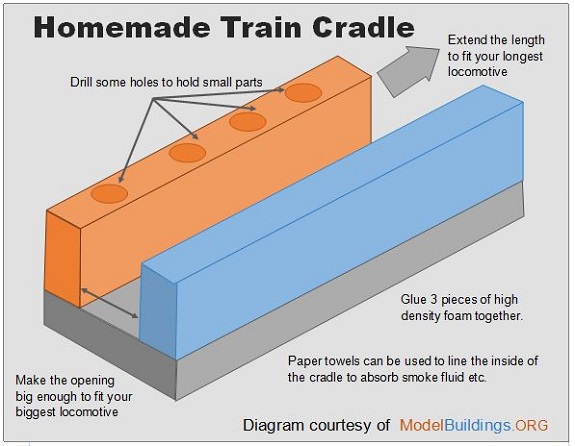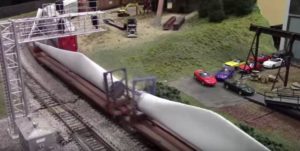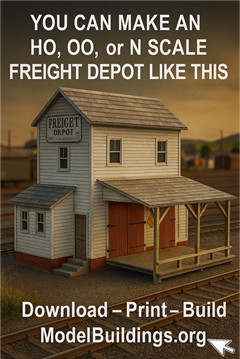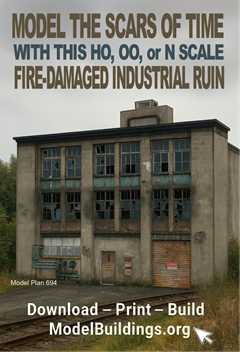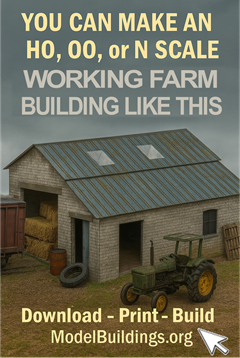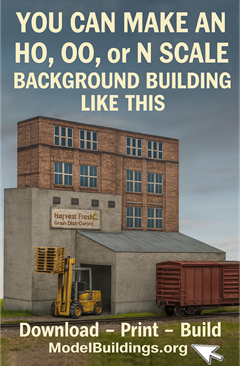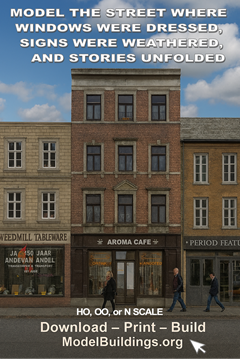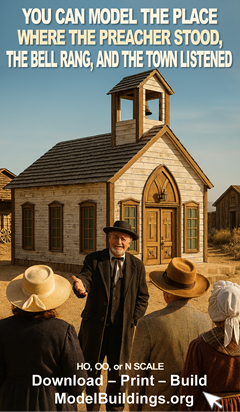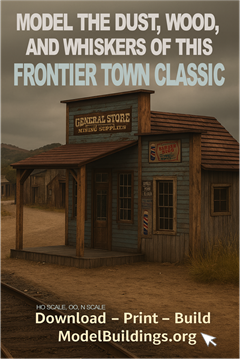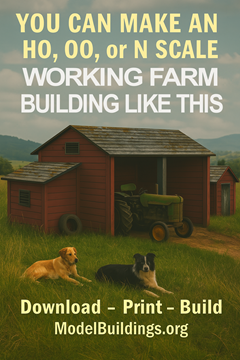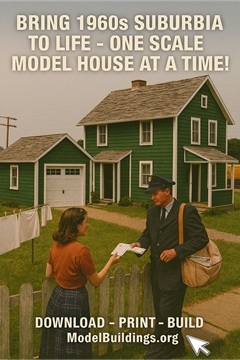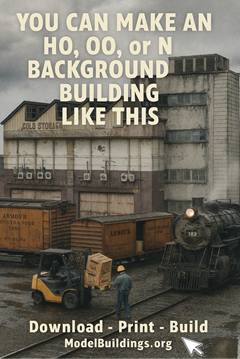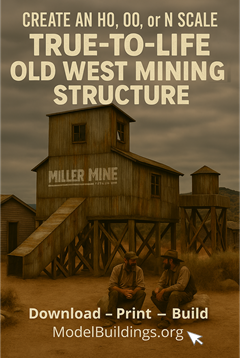Everything on model trains, model railroads, model railways, locomotives, model train layouts, scenery, wiring, DCC and more. Enjoy the world's best hobby... model railroading!
Ballasting Tip from Mike
Mike writes:
“This is not really a question but a great tip. I stumbled on a video showing a very fast, easy ballasting technique. Ballast mixed with DAP WELDWOOD PLASTIC RESIN GLUE. It is a dry glue mixed with the ballast at a 2 part ballast 1 part glue. Once you have the ballast where you want it, mist it, not spray, use a mister commonly found at Optometrists or in the pharmacy dept. A spray bottle, puts too much water out, mister is great but you still need to keep you distance. WET WATER is used in the mister, I use a drop of dish liquid and about 4 oz of water. Wipe your tracks and come back tomorrow!! The same concept works on ground foam as well.”
Turning Insulfrog Turnouts to Live for DCC
Duncan asks:
“Can anyone give me info about turning N gauge insulfrog turnouts to live for DCC? Also, were to buy the staple type converters from?”
Model Railways In South Africa
Peter Field from Pietermaritzburg, the capital and second-largest city in the province of KwaZulu-Natal, South Africa sent in this article and these photos to share with readers and hopefully inspire others to get involved in the wonderful hobby of model railroading. He even has a KIWI RAIL locomotive from New Zealand in his collection. Thank you Peter for sharing.
Peter writes –
 In 2009 I wrote on the article that was published on your blog on my Love Affair with trains and model railways.
In 2009 I wrote on the article that was published on your blog on my Love Affair with trains and model railways.
I built a demo layout for shows , however this turned into a more permanent layout, the layout was extended to its present size of 1.8m x1.2m then extended it and extended it yet to its present size of 5.5mx1.5m in 2018. This gives me +-14m of open trackage plus the shunting yards and run to the loco sheds. The layout is based on the South African railways in the 1960’s to 2018 or there about. Steam diesel and electric motive power operate on the board together as the layout is based on a small rural town near Pietermaritzburg in Natal.
I operate a fleet of 4 steam locomotives Class 16E the grey hound of the railways for its speed Class 15CA and classes 8-15. On the diesel side I have Class31,35,34,36 he electrics Class5E,6E, and the mighty Class 4E which was the largest Elec locomotive built for the SAR by England in the 1960’s. The layout is a single track with dual track in the station as a holding track. The layout consists of a small rural village, shops, houses farms factories and a station. The factories are a small furniture factory, Cat facility, and the container deposit with a fuel deposit.
The operation of the board is that I make up the freight or goods trains in the yards and bring them into the station to be hauled. The passenger stock consists of three types one vintage wooden balcony coaches of the 1950 – 1960’s and then the 1970’s steel bodied coaches of the old SAR and lastly the Trans Karoo train which is todays train which operate long distance Johannesburg – Cape Town – JHB – Durban etc. Which are shunted in the tards and made up and taken to the station to be hauled. If I am using a 1950’s – 1960’s Wooden stock, then the motive power would be steam or early Class 31 Diesels. Steel body coaches Class 5E-ClassE motive power and if the trans Karoo (which means barren Land) then Class 34 Diesel is used or Class 7E.
How do I operate the trains if I use a Goods train then it is made up and hauled by either Diesel or Elec motive power some times by steam the train is operated for +-0 15-20 minutes brought into the station and uncoupled and loco returned to the sheds and the Class 36 shunter brings the train to the shunting yards where it is shunted into the various sidings or side lines next to the factories. The speed depends on the load and quantity of wagons being hauled +- 80kph. The Passenger trains also start from the station and are hauled by Class 34-35 or Class 6E or 7E. I operate the passenger’s trains for 15 – 20 minutes with stops every so often to represent stations, when completed the locomotive goes back to the sheds. The class 36 locomotive is a shunter and stays into the yard but ventures to the main station every so often to collect or deliver coaches or wagons to be hauled., so I can hold one train whilst the other is in operation on the passing loop. The Hilton station has two lines one is the main line and the other is the passing loop to hold trains whilst the other is operating on the main line.
Another fact is that the Hilton station was built in the 1880’a as the main line from the coast to the hinter land was being built. It is a wooden and corrugated iron building which is still in operation today as a coffee e shop and has a large Model Railway museum housing some three large layouts. Which is on my layout today.
I have a piece of history that someone gave me some years ago. Some may recall that in the 1918 WW1 the peace treaty was signed in the dining salon 2419D in France by Germany and France. At the start of WW2 Hitler signed WW2 into operation in the same car at the same place in France and duly hijacked the dining salon which was part of the Wagon de Lits train Orient Express. This was used as his mobile war room during WW 2 and after the war was put in tunnel and burnt to ashes, however a sister to 2419D, was located in a museum in France after the war and duly named 2419D and is now a museum. There is never a dull moment as modellers know always something to do on the layout be it track work, scenery, erecting buildings painting and wiring etc.
Lastly, I have a visitor on my SAR system a Kiwi rail Diesel which is identical to the Class34 SAR. Many thanks for the wonderful news each month and the suggestions on model railroading in general.
Construction a Drop Leaf Access For Middle of Layout
Mike models HO and asks the following question. Readers are welcome to post diagrams, or photos in the COMMENTS under Mike’s post:
“What is the best way to build a drop leaf for access to middle of layout? We will be running 2 tracks across about 2 foot span.”
141 R1288 Lima Tender Stockist?
David L wants to locate a stockist for an HO steam train model 141 R1288 Lima tender. He asks: “Can somebody can help me to find it? Thanks a lot.”
Making A Cheap and Easy To Use Train Cradle
Bob has HO trains and posed this question:
“What are modelers using for train cradles to protect cars and locomotives from damage while working on them?”
There are many possible solutions. Here is one home-made design made from 1 inch thick high density foam. It could easily be adapted to individual needs. You could cut a variety of different sized foam inserts to simply put between the train and the sides to make the engine fit nice and snugly. You could angle cut edges of the foam if you find that easiest. Add your comments, and suggestions on what you use, or how to improve on the design shown below.
NCE Power Cab Problem
Jason models HO and his question is:
“Hello all, I have been of the armchair variety for many years due to funds, usable space, life etc. Over the years I have collected a few locos and finally have the space to build and as of now I have only straight track installed (no turnouts with the possibility of shorts), one DCC factory installed loco and a few older RTR units. When I first hooked up the system and programmed the one loco, things were great, somewhere along the line of installing decoders in the others, it seems the top speed is no where near what it was when I only had the one running.
Additionally, the initial start up response has decreased on the factory unit. The only CV’s I changed were on the older units that I had to install the decoders hardwire. It also seems step 18 or 19 is full (after power loss) and the remaining speed steps up to 28 are unresponsive. Momentum is at 0, all units CV 5 maxed at 255, CV 6 127, CV2 varies a little from one to the other, initial loco unchanged and everything has been triple checked.
All locos run perfectly just slower and this is with only one on the track at a time so I’m not pulling too much juice. Additionally, I noticed that with the loco (any) completely shut off the amp meter still reads .01 to .03 fluctuating, not sure if this is normal or may be a symptom of a failed or partially failing system? Hoping some of you experts can help a tech dinosaur!”
Is Kato Track Weatherproof?
David asks:
“Just wondering. Is N gauge Kato set track weather proof. And, if not, why? Thanks?”
Soldering Track Joints or Sticking With Rail Joiners?
Darryl sent in this question:
“I would like to know if I should solder all my track joints, or just use the rail joiners? I haven’t had any problems as yet, but I’m quite new to this. I read that jumper wires might be a better option allowing for expansion or contraction, given likely weather/humidity changes? Maybe I should solder the rail joiners as a back-up?”
Post your question using one of the many ASK A QUESTION links on this page.
Add your comment, if you would like to take part in the conversation. See the COMMENTS link below.
Also, please provide some feedback on the type size used in the this and the post under it. You will see we have used a larger font size than is used on earlier posts. Do you prefer the larger font size, or the small font size? Feedback appreciated.
Becoming Absorbed In Your Own Model Railroad Is A Great Way To Mentally Escape From The Real World Reality Facing Us All Right Now
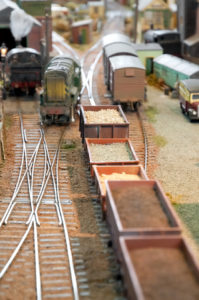 While it might not be possible to jump aboard the next plane to a tropical island-getaway, there are numerous ways to mentally escape from reality. Becoming absorbed working on, or operating, your own model railroad is a perfect way to achieve this if you are fortunate enough to have your own layout.
While it might not be possible to jump aboard the next plane to a tropical island-getaway, there are numerous ways to mentally escape from reality. Becoming absorbed working on, or operating, your own model railroad is a perfect way to achieve this if you are fortunate enough to have your own layout.
We all need an escape from reality once in awhile, and right now is probably a good time for us all to try an de-stress and take our minds off the worries of the world, even if it is just for an hour or two.
The hands-on world of model railroading is indeed a special experience and the perfect way to immerse yourself in a creative outlet. Truly escaping reality using your mind is easier for some than for others, but achieving a sense of calm (and distraction) can be a great way to feel reinvigorated and able to cope with anything that life may throw at you.
It doesn’t seem to matter whether you’re a spring chicken, an old rooster… or somewhere in between. The personal satisfaction of building and operating a realistic miniature world (real or fantasy) is rewarding and absorbing fun… no matter what age you are. Model railroading is a truly rewarding leisure activity that will keep you busy, entertained, absorbed, and mentally insulated from the worries of the world for hours on end. That’s not to say we should completely ignore the realities of the real world, but we are all entitled to rest and reinvigorate our minds with a little escapism from time to time.
Our thoughts and prays go out to all those who have suffered (and will suffer) from the dreadful outcomes of the COVID-19 virus that is impacting the world we share. Take care!
What’s The Best Method For Cleaning Track?
Jim asks:
“What is the best method to clean track other than a track eraser?“
Adding Sound and Lights to P & D Hobbies F Units
Kenneth has a question O scale, 2-rail enthusiast might be able to assist with:
“I have a number of P & D Hobbies F3 and F7 locomotives that I would like to upgrade with sound and lighting. Are there any easy drop in electronics for this?”
Walthers ML SD70 Engine Issues
HO enthusiast Matt sent in this question:
“I have a Walthers ML SD70 that runs almost perfect around my track. Just purchased 2 Scale Trains and 2 Athearn SD40-2’s. All 4 stutter or just don’t go at all. I made a small round test track that I could get them all to work after a few min with help nudging them along and would run fine. put them on my long track even with 2 power points in the middle and nothing again. “
Add your comment under this post.
Problem With Mantua 4-6-0 Locomotive Running Sluggishly
Dean sent in this question in the hope someone can assist:
“I have an HO scale Mantua 4-6-0 Rogers type steam locomotive and am having difficulties trying to figure out why it’s causing problems. It runs sluggish and almost stops at times. I did some troubleshooting by giving it an oil and cleaned the wheels but it hasn’t resolved the issue. I’m wondering if it could somehow relate to the binding? I admit it hasn’t been run much recently. I’m certain it’s not a track or power pack problem because I’ve operated larger engines on the same setup with any problems. It is sure to something that’s fixable, but what? Any thoughts would be very much appreciated. Thanking you.”
Send in your own question for publication using one of the ASK A QUESTION links on this blog.
Add a comment in answer to Deans post by using the COMMENTS link under his post.
Unusual Load on This Train
Lars sent in this photon he snapped at the Essex Model Train and Toy Show of a train transporting wind turbine blades. Not a sight you see everyday.
Missing Couplings
Mark will hopefully attach a photo in the comments section of his post where he asks:
“ I purchased two HO 4-6-0 hornby steam trains with tenders but having just looked closely I don’t see how I can connect them as there appears to be something missing, am I correct? Will need to attach photos when I can.
See marks photo when he posts it in the comments section under his post.
LED Lighting Rectifiers
Bill models G scale and sent in this question:
“I am trying to utilize a KBP 307 rectifier to convert 15v ac to dc for LED light strip purchased from a train show vendor. When connected to my transformer the ac side shorts out and won’t light the strip. The strip does light on dc just fine. Followed ac + – markings on rectifier ( the out side leads one on each side, two dc leads in the middle. What am I doing wrong”



